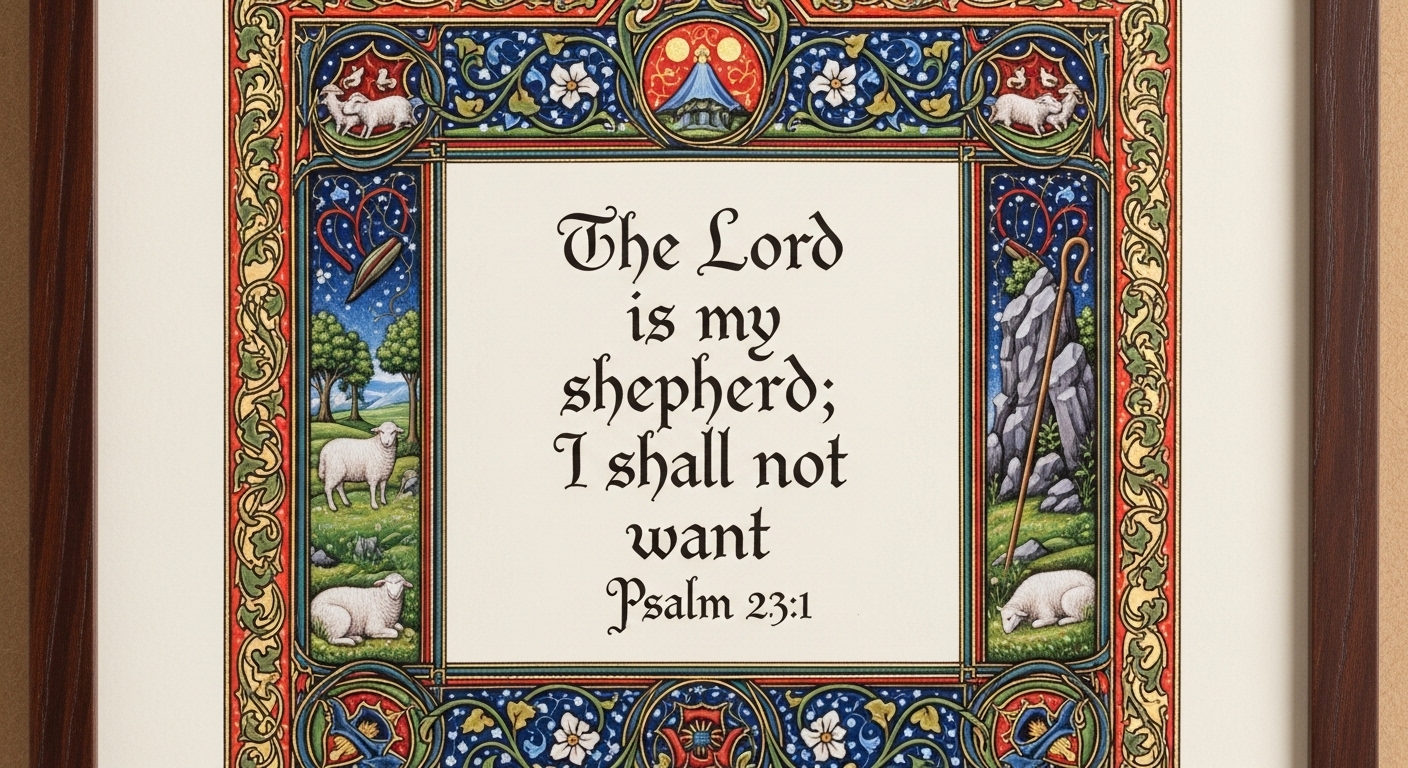The Lord Is My Shepherd — Trusting His Care In Psalm 23:1

Introduction
Have you ever felt like life is moving too fast, and you’re scrambling just to keep up? Maybe you’ve wrestled with worry about money, relationships, or what tomorrow will bring. Psalm 23:1 lands like a quiet rest in the middle of that noise: The Lord is my shepherd. You lack nothing. Right away, that simple declaration invites you to trust, to rest, and to choose a different posture toward life. In this article, you’ll explore what that line really means, how it worked in biblical times, and how it can reshape your everyday decisions, anxieties, and relationships. This matters because trusting God changes how you move through the world—more peace, clearer priorities, and a renewed sense of belonging.
The Bible Foundation
Bible verse — Psalm 23:1 (NIV):
Psalm 23:1 — “The Lord is my shepherd, I lack nothing.”

This verse opens one of the most beloved psalms in Scripture. The original audience knew shepherding intimately—sheep were valuable, vulnerable, and dependent. The metaphor tells you something important: God is not distant or abstract; He is personal and active, like a shepherd who watches, leads, protects, and provides. When David writes “I lack nothing,” he’s not claiming life will be problem-free. He’s declaring confidence that, under God’s care, essential needs will be met and His presence will be sufficient even through hardship. That simple sentence anchors the rest of the psalm, shaping how you interpret every valley and table, every anointing and comfort.
Understanding the Core Truth
At the heart of Psalm 23:1 is a single claim: you are under God’s personal care. To say “The Lord is my shepherd” is to accept that God knows you, leads you, and takes responsibility for your wellbeing in a way that allows you to stop trying to be self-sufficient. The core truth here is relational: God isn’t merely a concept that explains things; He is the one you follow. Saying “I lack nothing” reframes scarcity. It doesn’t erase challenges, but it reorients your perspective from what you fear you don’t have to what God faithfully provides. When you internalize that truth, your anxieties, ambitions, and priorities begin to align with a Shepherd who knows the way.
Going Deeper — The Hidden Meaning

Beneath the comforting language of a shepherd and sheep lie deeper spiritual realities. The shepherd’s role included guiding to pasture, leading to water, protecting from predators, and even carrying injured sheep. Spiritually, those actions translate to guidance in choices, refreshment for your soul, protection in trials, and healing when you’re broken. Think of the story of David himself: a shepherd who became king, but who never forgot the posture of dependence. Or consider Jesus, who later calls Himself the Good Shepherd (John 10), highlighting sacrificial love and intimate knowledge. The hidden lesson is this: God’s care is both practical and sacrificial. He tends the everyday needs and risks Himself for your rescue. That combination invites you to trust not only God’s provision but His heart.
Modern Connection — Relevance Today
How does a shepherd metaphor help you in a world of smartphones, mortgages, and commuter traffic? Surprisingly well. “The Lord Is My Shepherd” translates into modern life as a call to let God lead your decisions, calm your anxieties, and provide through community and faith. For example, when you worry about finances, trusting the Shepherd might mean seeking wise counsel, creating a budget, and relying on God’s provision rather than panic. In relationships, it might look like choosing forgiveness and humility because you believe God will lead healing. At work, it can mean pursuing integrity over short-term gain because you trust God’s guidance for the long haul. The image pushes you toward dependence and action—not passive waiting, but active trust rooted in God’s character.
Practical Application — Living the Message

You don’t have to make massive life changes overnight to live Psalm 23:1. Start small and steady. First, practice daily dependence: begin your morning with a short prayer asking the Shepherd to guide your choices. Second, cultivate contentment by listing three ways God provided that day—big or small—and thank Him aloud. Third, seek community: shepherding often involves others—pastors, friends, family—so invite trusted people into your struggles and decisions. Fourth, practice restful trust: set aside guilt around rest, recognizing that God’s leadership allows you to pause without anxiety. Finally, respond to scarcity with stewardship—manage what you have faithfully rather than hoarding or panicking. These steps help translate the focus keyword, The Lord Is My Shepherd, into everyday rhythms.
🌿 Faith Reflection Box
Take a moment to breathe. Ask yourself: Where are you trying to be your own shepherd? What would change if you let the Lord lead that area? Write down one small action you’ll take today to trust Him more.
Key Takeaways
- The Lord Is My Shepherd means God personally cares for and guides you.
- Trust isn’t passive; it becomes practical through prayer, stewardship, and community.
- Contentment grows when you remember God’s past provision and rely on His presence.
- Living under God’s care frees you to rest, act, and love with confidence.
Q&A
Q1: If “The Lord Is My Shepherd” is true, why do Christians still face hard times?
Answer: Even though Psalm 23:1 declares God’s care, it doesn’t promise a life free from trials. Instead, it promises presence, provision, and purpose in the midst of difficulty. Trials often shape character, deepen reliance on God, and reveal His faithfulness in ways comfort never could. You still get to ask God for help, trust His guidance, and look for His presence in the valley. For more on trusting God through hardship, you might find the article “Faith Like Abraham: Trusting God When You Can’t See the Way” on BibleStoriesHub helpful. Also see James 1:2-4 for perspective on trials and growth.
Q2: How can I cultivate a shepherd-like trust in everyday decisions?
Answer: Start with small, practical steps: pray specifically before decisions, seek godly counsel, and pause to listen for guidance instead of impulsively reacting. Regular Bible reading and quiet reflection train you to recognize God’s voice over time. Additionally, practice gratitude—tracking daily provisions helps you see God’s hand in small things. If you want a step-by-step guide, check out “Practical Habits for Daily Trust” at BibleStoriesHub: https://biblestorieshub.com/practical-habits-for-daily-trust. Scripture to reflect on: Proverbs 3:5-6, which encourages trusting God rather than leaning on your own understanding.
Q3: Does “I lack nothing” mean I’ll always get everything I want?
Answer: No—“I lack nothing” speaks to ultimate sufficiency under God’s care, not a guarantee that every desire will be fulfilled. God’s provision often meets your deepest needs—safety, guidance, presence—not every impulse or wish. Sometimes God says “no” because a different outcome serves your spiritual growth. For help understanding this balance, see “When God Says No” on BibleStoriesHub: How Does God Answer Your Prayers | When God Says NO, NOT YET and YES. Also see Romans 8:28 for assurance that God works for good even when circumstances are hard.
Q4: How do I know God is leading me and not just my own wishful thinking?
Answer: Discerning God’s voice involves alignment with Scripture, peace that persists beyond emotions, and confirmation through wise counsel and circumstances. If a decision conflicts with biblical wisdom, it’s likely not from God. Pray for clarity, seek input from trusted believers, and look for open or closed doors that affirm God’s leading. For more on discernment, you might read “Samuel’s Call – Hearing God’s Voice in a Noisy World” at BibleStoriesHub. Scripture to guide you: Philippians 4:6-7, which links prayer and God’s peace.
Conclusion & Reflection
When you say, “The Lord Is My Shepherd,” you’re stepping into a lifelong relationship of care, guidance, and provision. That doesn’t eliminate difficulty, but it places every moment—quiet or chaotic—under God’s loving oversight. As you leave this piece, take one small step today: speak Psalm 23:1 aloud and mean it; then do one practical thing that trusts God (make a call, forgive, share a meal, rest). Let this truth shape your days: you are known, led, and provided for.

A short prayer: Lord, thank You for being my Shepherd. Help me trust You with my needs, my fears, and my future. Teach me to rest in Your care and follow Your lead with courage. Amen.
Explore More
For further reading and encouragement, check out these posts:
👉 7 Bible Verses About Faith in Hard Times
👉 Job’s Faith: What We Can Learn From His Trials
👉 How To Trust God When Everything Falls Apart
👉 Why God Allows Suffering – A Biblical Perspective
👉 Faith Over Fear: How To Stand Strong In Uncertain Seasons
👉 How To Encourage Someone Struggling With Their Faith
👉 5 Prayers for Strength When You’re Feeling Weak

📘 Jesus and the Woman Caught in Adultery – Grace and Mercy Over Judgement
A powerful retelling of John 8:1-11. This book brings to life the depth of forgiveness, mercy, and God’s unwavering love.
👉 Check it now on Amazon 🛒💥
🔥 “Every great message deserves a home online.” 🌍💬🏡
Don’t let your calling stay hidden. Start a Christian blog or website using Hostinger — with 99.9% uptime, a free domain, and SSL, your voice can shine for God’s glory anytime, anywhere.
💥 Begin today. 🛒 Try it RISK-FREE! ✅
✝️ “Your body is God’s temple — care for it with purpose.” 💪💖🏛️
Renew your energy and restore balance naturally. Mitolyn helps support a healthy metabolism, giving you the vitality to live out God’s calling with strength and confidence.
🔥 Unlock Your Metabolic Power! ⚡Burn More Calories & Feel Great With Mitolyn. 💪
👉 Start Today. 🚀 Check Price Now. 🛒💰
💰 As a ClickBank & Amazon Affiliate, I earn from qualifying purchases.
📖 Acknowledgment: All Bible verses referenced in this article were accessed via Bible Gateway (or Bible Hub).
🚀 Want to explore more? 👉 Dive into our new post on Why Jesus? and experience the 🔥 life-changing truth of the Gospel!








